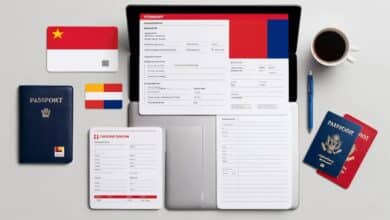How to Apply for a Sponsored Nursing Job in Canada: Step-by-Step Overview
Healthcare professionals looking to advance their careers abroad will find growing opportunities in North America’s northern neighbor.
Recent workforce shortages have opened doors for skilled workers to fill critical roles. This guide breaks down the process for those aiming to join the healthcare system through structured pathways.
The journey begins with understanding provincial licensing requirements. Every region has unique standards for evaluating education, experience, and language skills. Applicants must complete credential assessments and exams to prove their qualifications meet local expectations.
Preparing documentation early is essential. Steps include verifying work history, securing language test results, and researching provincial nomination programs. Many candidates benefit from Express Entry streams tailored to fast-track skilled workers into permanent roles.
With careful planning, international healthcare workers can navigate this process efficiently. Knowing timelines, costs, and regional differences ensures smoother transitions. This overview provides clarity for those ready to take the next step toward a rewarding career.
Overview of the Sponsored Nursing Job Application Process
As healthcare systems worldwide grapple with staffing crises, structured pathways now enable qualified professionals to address critical gaps. Canada’s healthcare sector relies heavily on international talent to maintain service quality, particularly after recent global challenges reshaped workforce needs.
Understanding the Role and Demand for International Nurses
Every province faces a pressing need for skilled healthcare workers. Urban hospitals and rural clinics alike compete to hire professionals capable of supporting overstretched teams. The labour market shows no signs of slowing, with retirement rates and population growth outpacing new graduate numbers.
Government initiatives prioritize faster credential recognition and permanent residency pathways for those entering the field. Smaller communities often provide additional incentives like housing support or signing bonuses to attract candidates.
Impact of COVID-19 on Nurse Shortages
The pandemic accelerated retirements and increased patient care demands simultaneously. This dual pressure led to policy changes, including Express Entry draws focused specifically on healthcare roles. Provincial governments now collaborate with federal agencies to reduce processing times for qualified applicants.
These shifts highlight long-term opportunities for professionals seeking stable work abroad. With aging populations requiring more care, Canada’s immigration strategies will likely continue prioritizing this sector for years.
Steps to Secure nursing visa sponsorship in Canada
Navigating the path to practice as a healthcare professional requires understanding regional protocols. Each territory maintains unique steps for international candidates seeking employment authorization. Below are key phases to streamline this journey.
Researching Provincial Associations and Licensing Bodies
Regional regulatory organizations dictate specific criteria for eligibility. For example, Ontario’s College of Nurses charges $678 for credential reviews, while Newfoundland’s fee is $169.50. Processing spans 3-8 months depending on documentation complexity.
The National Nursing Assessment Service (NNAS) evaluates education and qualifications. This standardized report helps provincial bodies determine if applicants meet local standards. Nurses from India or Nigeria often need extra SEC reviews to confirm competency equivalence.
Self-Assessment and Document Preparation
Candidates should first compare their training with Canadian benchmarks. Essential materials include academic transcripts, employment verification letters, and language test results. Organizing these early prevents delays.
Some regions require proof of clinical hours or specialized certifications. Professionals with non-English education may need translated documents certified by approved agencies.
Meeting Examination and Language Proficiency Requirements
Most provinces mandate English tests like CELBAN or IELTS. French-speaking territories accept TEF scores. Nurses must also pass exams like NCLEX-RN or CPNRE to demonstrate clinical knowledge.
Work permit applications proceed alongside licensing. Employers often provide sponsorship letters to support this process, linking job offers to immigration pathways.
Federal and Provincial Immigration Pathways for Nurses
The combination of federal and provincial initiatives creates diverse opportunities for skilled professionals seeking to immigrate. Two primary systems streamline this process: the centralized Express Entry platform and region-specific nomination programs. These pathways help address critical workforce needs while offering candidates flexibility based on their qualifications.
Express Entry and Federal Skilled Worker Programs
The Express Entry system ranks applicants through a points-based model. Factors like age, education, and language scores determine placement in the entry pool. Healthcare professionals often gain advantages through the Federal Skilled Worker Program, which prioritizes occupations facing shortages.
Valid job offers or provincial nominations boost scores significantly. Recent updates introduced priority draws for healthcare roles, accelerating invitations to apply for permanent residency. Candidates with strong profiles typically receive decisions within six months.
Provincial Nominee Programs and Regional Assessments
Provinces design tailored streams to meet local demands. Nova Scotia’s Regional Labour Market Demand Stream fast-tracks skilled workers in high-need fields. Other regions like Alberta and British Columbia offer similar programs with reduced eligibility thresholds.
Key benefits of provincial nominee programs include:
- Faster processing compared to federal routes
- Lower language score requirements in some regions
- Dedicated support for healthcare applicants
Many candidates apply through multiple pathways simultaneously to maximize success chances. This layered approach helps skilled workers navigate the immigration system effectively.
Conclusion
Countries with aging populations are actively recruiting skilled healthcare workers to address growing medical needs. Professionals who meet educational benchmarks and pass required exams can access accelerated immigration programs. These pathways help bridge workforce gaps while offering long-term career stability.
Key steps include credential evaluations, language proficiency tests, and selecting appropriate immigration streams. Programs like Express Entry prioritize candidates with verified experience and qualifications. Provincial systems may process applications faster, but requirements vary significantly by region.
Preparation timelines typically span 3-8 months, depending on documentation completeness and program choice. Successful applicants often secure work permits through employer-supported pathways or regional nominations. Maintaining organized records and understanding provincial licensing standards proves critical throughout the process.
While the journey demands dedication, the rewards include competitive salaries and professional growth opportunities. Early planning with immigration experts can streamline complex assessments and application procedures. With strategic preparation, qualified professionals can efficiently transition into fulfilling roles abroad.
For more information, explore the official visa website mentioned in this article:
You will be redirected to another website
FAQ
What federal immigration programs are available for healthcare professionals seeking roles in Canada?
The Express Entry system manages applications for the Federal Skilled Worker Program, which prioritizes candidates with qualifications, language proficiency, and work experience. Nurses with at least one year of skilled employment may qualify for permanent residency through this pathway.
How do Provincial Nominee Programs differ from federal pathways for medical staff?
Provincial Nominee Programs (PNPs) allow provinces like Nova Scotia and Ontario to address regional labor shortages. Some streams, such as the Healthcare Priorities Stream, fast-track eligible candidates with job offers or relevant experience in high-demand fields.
What steps are required to obtain licensure for clinical practice in Canada?
Applicants must submit credentials to the National Nursing Assessment Service (NNAS) for evaluation. Additional requirements include passing the NCLEX-RN exam, demonstrating language competency via IELTS/CELPIP, and securing provincial registration through bodies like the College of Nurses of Ontario.
How has the pandemic influenced opportunities for internationally trained healthcare workers?
COVID-19 intensified demand for clinical staff, prompting provinces to streamline licensing and immigration processes. Temporary policies, such as extended work permits and accelerated permanent residency pathways, were introduced to address critical shortages.
What documents are essential when applying through the Express Entry pool?
Key materials include Educational Credential Assessments (ECA), proof of language test results, employment reference letters, and a valid job offer (if applicable). Candidates must also meet the Comprehensive Ranking System score cutoff for invitations to apply.
Can candidates apply for permanent residency without prior Canadian work experience?
Yes. The Federal Skilled Worker Program does not require Canadian experience but prioritizes education, language skills, and foreign work history. Provincial Nominee Programs may also nominate individuals based on job offers or regional labor needs.
Are there temporary work permits available for healthcare roles while awaiting permanent residency?
Employers can sponsor candidates through the Temporary Foreign Worker Program (TFWP) or International Mobility Program (IMP). Some permits, like those under the Global Talent Stream, offer expedited processing for occupations in urgent demand.
Published on: 4 de July de 2025







